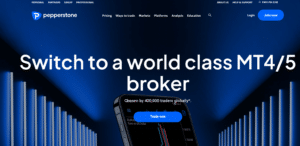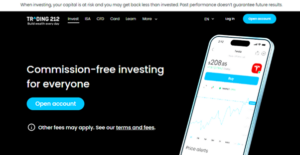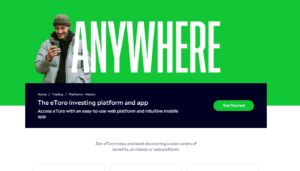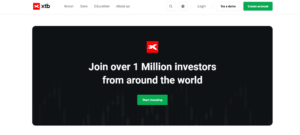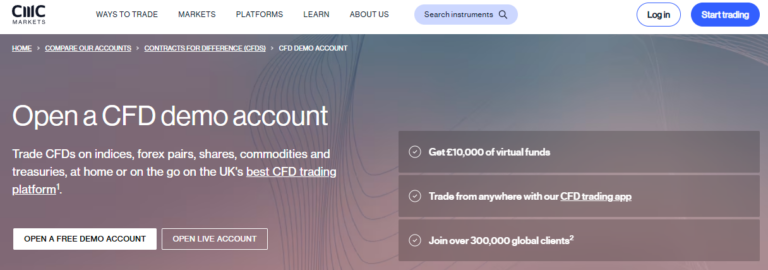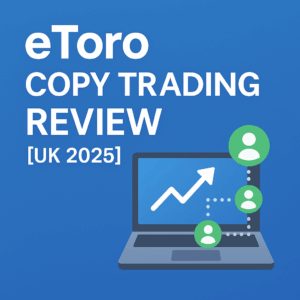
- expertise:
- CFD Trading, Forex, Derivatives, Risk Management
- credentials:
- Chartered ACII (2018) · Trading since 2012
- tested:
- 40+ forex & CFD platforms with live accounts

- expertise:
- Platform Testing, Cryptocurrency, Retail Investing
- credentials:
- Active investor since 2013 · 11+ years experience
- tested:
- 50+ platforms · 200+ guides authored

- expertise:
- Broker Comparison, ISA Strategy, Portfolio Management
- credentials:
- Active investor since 2013 · 11+ years experience
- tested:
- 40+ brokers with funded accounts

- expertise:
- CFD Trading, Forex, Derivatives, Risk Management
- credentials:
- Chartered ACII (2018) · Trading since 2012
- tested:
- 40+ forex & CFD platforms with live accounts

- expertise:
- Platform Testing, Cryptocurrency, Retail Investing
- credentials:
- Active investor since 2013 · 11+ years experience
- tested:
- 50+ platforms · 200+ guides authored

- expertise:
- Broker Comparison, ISA Strategy, Portfolio Management
- credentials:
- Active investor since 2013 · 11+ years experience
- tested:
- 40+ brokers with funded accounts
How We Test
Real accounts. Real money. Real trades. No demo accounts or press releases.
What we measure:
- Spreads vs advertised rates
- Execution speed and slippage
- Hidden fees (overnight, withdrawal, conversion)
- Actual withdrawal times
Scoring:
Fees (25%) · Platform (20%) · Assets (15%) · Mobile (15%) · Tools (10%) · Support (10%) · Regulation (5%)
Regulatory checks:
FCA Register verification · FSCS protection (£120,000 per person)
Testing team:
Adam Woodhead (investing since 2013), Thomas Drury (Chartered ACII, 2018), Dom Farnell (investing since 2013) — 50+ platforms with funded accounts
Quarterly reviews · Corrections: info@theinvestorscentre.co.uk
Disclaimer
Not financial advice. Educational content only. We're not FCA authorised. Consult a qualified advisor before investing.
Capital at risk. Investments can fall. Past performance doesn't guarantee future results.
CFD warning. 67-84% of retail accounts lose money trading CFDs. High risk due to leverage.
Affiliate disclosure. Broker buttons and "Get Started" links are affiliate links. We may earn a commission if you open an account — at no extra cost to you. This never affects our ratings, rankings, or recommendations, which are based solely on our independent testing methodology.
Contact: info@theinvestorscentre.co.uk
Pepperstone offers the best demo account for most UK traders in 2026, combining realistic market conditions with flexible virtual funds up to £50,000 across MT4, MT5, cTrader, and TradingView. But the right demo depends entirely on what you’re practising for.
I’ve tested demo accounts from dozens of UK brokers over the past year. Some replicate live trading almost perfectly. Others? Glorified video games that teach you nothing useful. The gap matters more than most beginners realise — what works in a poor demo often fails spectacularly with real money.
This guide covers seven FCA-regulated brokers with genuinely useful demo accounts. I’ll explain what each does well, where they fall short, and which traders they actually suit. No affiliate rankings here — just practical assessments based on real testing.

Pepperstone
Demo Account Score: 4.8/5
72% of retail CFD accounts lose money.

IG
Demo Account Score: 4.7/5
68% of Retail CFD Accounts Lose Money

Trading 212
Demo Account Score: 4.5/5
When investing, your capital is at risk

eToro
Demo Account Score: 4.3/5
61% of retail CFD accounts lose money.
Quick Answer: What Are the Best Demo Accounts in the UK?
Pepperstone ranks as the best overall demo account for UK traders, particularly for forex and CFD practice. IG suits experienced traders testing strategies across 15,000+ markets. Trading 212 works best for beginners wanting to learn stock investing without complexity.
How do the Brokers with Demo Accounts Compare?
| Rank | Broker | Virtual Funds | Demo Duration | Platforms | Best For |
|---|---|---|---|---|---|
| 1 | Pepperstone | Up to £50,000 | 30-60 days (unlimited with live account) | MT4, MT5, cTrader, TradingView | Forex & CFD traders |
| 2 | IG | £10,000 | Unlimited | IG platform, MT4 | Strategy testing on 15,000+ markets |
| 3 | Trading 212 | £5,000 (reset up to £50,000) | Unlimited | Trading 212 app | Beginner stock investors |
| 4 | eToro | $100,000 | Unlimited | eToro platform | Social & copy trading practice |
| 5 | CMC Markets | £10,000 (can add more) | Unlimited (30 days for shares) | CMC platform, MT4 | Advanced charting & analysis |
| 6 | XTB | £100,000 | Unlimited | xStation 5 | Active CFD traders |
| 7 | Plus500 | Unlimited (adjustable) | Unlimited | Plus500 platform | Simple CFD practice |
Top 7 Demo Trading Accounts in the UK Reviewed
- Pepperstone – Best Overall for Forex Demo Trading
- IG – Best for Experienced Traders Testing Strategies
- Trading 212 – Best Free Demo for Beginner Investors
- eToro – Best Demo for Social and Copy Trading
- CMC Markets – Best Demo for Advanced Charting
- XTB – Best Demo for Active CFD Traders
- Plus500 – Simple Demo for CFD Traders
Expert Verdict
Pepperstone’s demo account stands out because it mirrors their live environment almost exactly. You get up to £50,000 in virtual funds across MT4, MT5, cTrader, or TradingView — the same platforms professional forex traders actually use.
Pros & Cons
- Fast trade execution with competitive spreads
- Availability of widely used, professional trading platforms
- Accurate simulation of forex and commodity market conditions
- Demo access expires after 30 days
- Limited product range beyond forex
-
How Realistic Is Pepperstone’s Demo Compared to Live Trading?
-
Does Pepperstone’s Demo Help You Build Trading Discipline?
-
What Are the Limitations of Pepperstone’s Demo?
-
Who Is Pepperstone’s Demo Best Suited For?
Pepperstone’s demo uses real market pricing and the same execution engine as live accounts. Spreads match what you’d pay with real money, and order types work identically. The main difference? Demo trades don’t experience slippage during high volatility — something you’ll definitely encounter live. I’d recommend practising during major news releases to see how quickly markets can move, even if the demo won’t reject orders the way live execution sometimes does.
Better than most. The platform tracks your demo performance with the same analytics you’d get on a live account. You can review trade history, analyse win rates, and identify patterns in your decision-making. The 30-60 day expiry on standard demos (60 days for MT4/MT5) actually helps — it creates some urgency to take your practice seriously rather than treating it as a game with infinite resets.
The time limit is the obvious one. Unless you open and fund a live account, your demo expires. Some features like swap-free accounts aren’t available in demo mode either. And while you can create up to 5 demo accounts (10 with a live account), you’ll need to contact support to top up virtual funds on MT4/MT5 demos.
Forex and CFD traders who want professional-grade platforms. If you’re planning to use MT4 or MT5 for live trading, Pepperstone’s demo is the logical starting point. Less suited for pure stock investors or complete beginners who might find the platform complexity overwhelming at first.
72% of retail investor accounts lose money when trading CFDs with this provider. You should consider whether you can afford to take the high risk of losing your money.
Expert Verdict
IG’s demo gives you £10,000 in virtual funds with access to 15,000+ markets — everything from forex and indices to individual shares and options. The demo runs indefinitely, so there’s no pressure to rush your learning.
Pros & Cons
- Realistic market conditions
- Professional tools and charting
- Backed by a trusted, FCA-regulated broker
- Demo expires after 14 days
- Not beginner-friendly
-
How Realistic Is IG’s Demo Compared to Live Trading?
-
Does IG’s Demo Help You Build Trading Discipline?
-
What Are the Limitations of IG’s Demo?
-
Who Is IG’s Demo Best Suited For?
IG’s demo environment is genuinely impressive in scope. You can practise on their proprietary platform or MT4, accessing the full range of markets available to live traders. Real-time pricing means your practice sessions reflect actual market conditions. That said, IG explicitly notes that demo trades won’t face slippage, interest adjustments, or out-of-hours price movements — factors that definitely affect live results.
IG pairs its demo with IG Academy, a structured educational programme that walks you through trading concepts systematically. This combination works well — you learn theory, then immediately practise it. The platform also includes alerts, watchlists, and charting tools identical to the live version, so you’re building genuine familiarity with professional trading infrastructure.
The £10,000 starting balance is modest compared to some competitors. You can’t easily add more virtual funds, which limits testing of larger position sizes. Also, some advanced chart packages that cost money on live accounts are free in demo — meaning you might get accustomed to tools you’d have to pay for later.
Intermediate to experienced traders who want to test strategies across diverse markets. IG’s breadth is unmatched, but the platform assumes some trading knowledge. Complete beginners might find the sheer number of options overwhelming. Best for those who already understand basic concepts and want serious practice before going live.
Spread bets and CFDs are complex instruments and come with a high risk of losing money rapidly due to leverage. 68% of retail investor accounts lose money when trading spread bets and CFDs with this provider. You should consider whether you understand how spread bets and CFDs work, and whether you can afford to take the high risk of losing your money.
Expert Verdict
Trading 212’s “Practice Mode” offers the simplest path into investing for UK beginners. You start with £5,000 in virtual funds (adjustable up to £50,000) and can practise buying stocks, ETFs, and fractional shares with zero complexity.
Pros & Cons
- Unlimited demo access
- Clean, intuitive layout
- Great for stock and ETF investing
- No CFDs or complex assets in demo
- Limited appeal for active or technical traders
-
How Realistic Is Trading 212’s Demo Compared to Live Trading?
-
Does Trading 212’s Demo Help You Build Trading Discipline?
-
What Are the Limitations of Trading 212’s Demo?
-
Who Is Trading 212’s Demo Best Suited For?
Trading 212’s demo replicates their live platform almost perfectly — same interface, same markets, same execution. For stock investing (not CFDs), this means you’re practising the actual experience of building a portfolio. The app lets you switch between Practice and Real mode instantly, which makes the transition feel natural. Just remember: demo accounts don’t simulate slippage or the emotional weight of real money.
For investing specifically, yes. The platform encourages long-term thinking over frantic trading, and the Practice mode lets you watch how a diversified portfolio performs over weeks or months. You can build pies (automated portfolios), test different allocation strategies, and see compound growth in action. The CFD demo is separate and serves more active traders.
If your demo goes inactive too long, it may be deactivated — though you can open a new one. The demo also doesn’t teach you about the tax implications of investing, ISA limits, or dividend reinvestment mechanics beyond the basics. And if you want MT4 or advanced charting, you won’t find it here.
Complete beginners who want to learn investing (not trading) in the simplest environment possible. Ideal if you’re building your first portfolio and want platforms suitable for beginners without complicated features getting in the way.
Trading and investing involve risk. The value of your investments can go up or down, and you may lose all or part of your capital. These products may not be suitable for all investors. Please ensure you fully understand the risks involved.
Expert Verdict
eToro’s Virtual Portfolio gives you $100,000 to practise everything the platform offers — including copy trading, Smart Portfolios, and social features. No other demo lets you simulate following other traders’ moves this thoroughly.
Pros & Cons
- Unlimited access with a generous virtual balance
- Beginner-friendly layout
- Social trading for passive learning
- Limited advanced charting tools
- Less suited to technical or high-frequency traders
-
How Realistic Is eToro’s Demo Compared to Live Trading?
-
Does eToro’s Demo Help You Build Trading Discipline?
-
What Are the Limitations of eToro’s Demo?
-
Who Is eToro’s Demo Best Suited For?
eToro’s demo mirrors live trading conditions closely. You can copy real traders in demo mode — their actual live trades trigger corresponding virtual trades in your practice account. This is genuinely useful for understanding how copy trading works before committing real money. Market prices are real-time, and the interface is identical to the live platform. The gap? No fees apply in demo mode, so you won’t see how spreads and overnight charges eat into copied trades.
Partially. The $100,000 balance is generous — perhaps too generous. It can encourage position sizes you’d never risk with real money, which builds unrealistic expectations. The social aspect helps more: watching how Popular Investors manage drawdowns and position sizing teaches practical risk management better than most educational content.
The platform is simpler than MT4 or dedicated charting software, which some traders outgrow. Demo also doesn’t reflect eToro’s withdrawal fees or currency conversion costs. And the generous virtual balance can create a false sense of confidence — $100,000 lets you survive mistakes that would devastate a £500 starter account.
Anyone interested in social investing or copy trading platforms. If you want to follow experienced traders rather than make independent decisions, eToro’s demo is the best way to test that approach. Less suitable for traders who want advanced technical analysis tools.
61% of retail CFD accounts lose money when trading CFDs with this provider.
Expert Verdict
CMC Markets provides £10,000 in virtual funds on one of the most sophisticated charting platforms available to retail traders. If technical analysis is your focus, this demo environment is hard to beat.
Pros & Cons
- Professional-grade platform
- Huge range of instruments
- Excellent charting and technical features
- Complex interface may overwhelm newcomers
- More time required to learn the platform
-
How Realistic Is CMC Markets’ Demo Compared to Live Trading?
-
Does CMC Markets’ Demo Help You Build Trading Discipline?
-
What Are the Limitations of CMC Markets’ Demo?
-
Who Is CMC Markets’ Demo Best Suited For?
CMC’s demo runs on the same Next Generation platform used for live trading — same charts, same indicators, same execution interface. You get real-time market data for forex, indices, and commodities. The realism gap appears mainly with shares: demo access to UK stocks expires after one calendar month due to exchange data restrictions. Plan accordingly if equity trading is your focus.
The platform’s strength is analytical depth. Over 80 technical indicators, pattern recognition tools, and Reuters news integration let you practise proper market analysis. CMC doesn’t hand-hold like some beginner platforms — you’re expected to develop your own approach using professional tools. This builds better habits than simplified interfaces, though the learning curve is steeper.
The 30-day limit on share CFD data is frustrating for equity traders. You also won’t see the cost of live market data subscriptions that apply to some CFD accounts. And like most demos, CMC’s doesn’t simulate the psychological pressure of real money at risk.
Traders who want to develop technical analysis skills on a professional platform. If you’re serious about chart reading and indicator-based strategies, CMC’s demo offers the tools. Not ideal for beginners who might feel overwhelmed by the interface complexity.
CFDs are complex instruments and come with a high risk of losing money rapidly due to leverage. 64% of retail CFD accounts lose money. You should consider whether you understand how CFDs work and whether you can afford to take the high risk of losing your money.
Expert Verdict
XTB’s demo account starts you with £100,000 in virtual funds on their award-winning xStation 5 platform. The generous balance lets you practise realistic position sizing across 2,100+ CFD instruments.
Pros & Cons
- Realistic trading environment
- Excellent for CFD and forex testing
- Strong in-platform educational resources
- Less appealing to passive or stock-only investors
- No access to traditional share investing tools
-
How Realistic Is XTB’s Demo Compared to Live Trading?
-
Does XTB’s Demo Help You Build Trading Discipline?
-
What Are the Limitations of XTB’s Demo?
-
Who Is XTB’s Demo Best Suited For?
XTB’s demo provides access to the same xStation 5 platform used for live trading, complete with real market data and identical execution. You can practise on forex, indices, commodities, and stock CFDs under genuine market conditions. The demo doesn’t expire — a significant advantage for traders who want extended practice periods. However, you’ll need to use XTB’s mobile app to open a demo account if you’re a UK resident.
xStation includes built-in performance analytics, trade calculators, and a market scanner that help develop systematic trading habits. The Education tab provides structured learning within the platform itself. XTB also assigns dedicated analysts whose market commentary appears directly in the demo environment, giving you professional insights while you practise.
The platform is CFD-focused, so it’s less useful if you want to practise long-term stock investing. xStation 5 is proprietary — meaning skills don’t transfer directly if you later switch to an MT4/MT5 broker. And while you can adjust demo balances via the Client Office, the process isn’t as instant as some competitors.
Active CFD traders who plan to stick with XTB long-term. The generous virtual funds and no-expiry policy make it excellent for extended practice. If you’re comparing forex broker options, XTB’s demo lets you thoroughly test their offering.
71% of retail investor accounts lose money when trading CFDs with this provider. You should consider whether you can afford to take the high risk of losing your money.
Expert Verdict
Plus500 offers an unlimited demo with adjustable virtual funds and no time limit — one of the most accessible entry points for CFD practice. The platform prioritises simplicity over advanced features.
Pros & Cons
- Unlimited demo with automatic fund reset
- Easy-to-use, beginner-friendly platform
- Wide range of CFD markets
- Limited tools for technical traders
- No MetaTrader or advanced platform support
-
How Realistic Is Plus500’s Demo Compared to Live Trading?
-
Does Plus500’s Demo Help You Build Trading Discipline?
-
What Are the Limitations of Plus500’s Demo?
-
Who Is Plus500’s Demo Best Suited For?
Plus500’s demo replicates their live platform exactly — same interface, same instruments, same execution. Real-time quotes mean you’re practising with actual market prices. The platform automatically restores your virtual balance when it drops below €200 equivalent, so you can practise indefinitely without running out of funds. This mirrors the live experience closely, minus the emotional stakes.
To a point. The simple interface makes learning basic CFD mechanics straightforward — opening positions, setting stops, understanding margin. But Plus500 lacks the advanced charting and analytical tools that develop deeper trading skills. It’s a good place to start, but most serious traders eventually need more sophisticated platforms.
The platform is deliberately simplified, which means limited charting capabilities and no MT4 integration. Educational resources are basic compared to IG or CMC Markets. And the ease of topping up virtual funds can reduce the “stakes” feeling that makes demo practice valuable.
Complete beginners who want to understand CFD basics without complexity. Plus500’s demo excels at teaching fundamental concepts: what margin means, how overnight fees work, why position sizing matters. But traders who develop beyond basics will likely migrate to platforms with more analytical depth.
68% of retail investor accounts lose money when trading CFDs with this provider. You should consider whether you can afford to take the high risk of losing your money.
What Is a Demo Trading Account?
A demo trading account lets you practise buying and selling financial instruments using virtual money instead of real capital. You get access to live market prices and real trading platforms, but your profits and losses exist only on paper.
Most UK brokers offer free demo accounts as part of their standard offering. You’ll typically receive between £5,000 and £100,000 in virtual funds, depending on the broker. Some demos expire after 30-60 days; others run indefinitely.
The terms “demo account,” “practice account,” and “paper trading” mean the same thing. Paper trading is the older term — it comes from the days when traders would write hypothetical trades on paper to test strategies before risking real money.
Demo accounts serve two main purposes. For beginners, they’re a risk-free way to learn how markets work and get comfortable with trading platforms. For experienced traders, they’re testing grounds for new strategies or unfamiliar markets. Either way, the goal is building skills and confidence before real money enters the equation.
Demo vs Live Trading: What's the Difference?
Demo and live trading use the same platforms and market prices, but the experience differs in ways that matter more than most beginners expect.
Execution and Slippage Differences
Demo trades execute instantly at the price you see. Live trades don’t always. During volatile markets — news releases, market opens, flash crashes — your order might fill at a different price than displayed. This is called slippage, and it can work for or against you. Demo accounts typically don’t simulate this, which makes them feel smoother than reality.
Some brokers also reject live orders during extreme volatility or if your position size exceeds available liquidity. Demo accounts rarely reject orders, creating an artificially frictionless experience.
The Emotional Factor Demo Accounts Can't Replicate
Here’s the uncomfortable truth: watching £10,000 in virtual money drop 20% feels nothing like watching your actual savings do the same. Demo trading can teach you mechanics, but it can’t teach you how you’ll react when real money is at stake.
Many traders who perform brilliantly on demo accounts struggle when they go live. They second-guess entries, close winners too early, hold losers too long. The psychological pressure changes everything. This isn’t a flaw in demo accounts — it’s simply a limitation worth understanding upfront.
Why Demo Success Doesn't Guarantee Live Profits
Demo accounts also encourage behaviour that destroys live accounts. Taking oversized positions feels fine when the money isn’t real. Ignoring stop-losses seems harmless when you can just reset. These habits become expensive quickly once real capital is involved.
The solution? Treat demo trading seriously. Use position sizes you’d actually use live. Follow your risk rules even when there’s no financial consequence. The traders who transition successfully are those who practise like it matters.
How to Choose the Right Demo Account
The best demo account depends on what you’re trying to learn and which broker you’ll eventually use for live trading.
Consider Your Trading Style
Forex and CFD traders should prioritise demos with MT4/MT5 access — these platforms are industry standard, and skills transfer between brokers. Stock investors focused on long-term portfolios need less platform sophistication; Trading 212 or eToro’s simpler interfaces work fine. Active day trading requires demos with advanced charting and fast execution — CMC Markets or Pepperstone fit better.
Check Demo Duration and Reset Options
If you need extended practice time, avoid demos that expire after 30 days unless you’re ready to open a live account. XTB, Plus500, and eToro offer unlimited demos. Pepperstone’s demos expire but can become permanent once you fund a live account. Also check whether you can reset your virtual balance — useful if you want to start fresh after testing a failed strategy.
Evaluate Platform and Tools Access
Some demos restrict features available on live accounts. CMC Markets limits share CFD data to 30 days. IG includes free chart packages that cost money on live accounts. Make sure the demo gives you access to the markets and tools you’ll actually use.
Look for Educational Resources
A demo alone teaches mechanics, not strategy. Brokers like IG (IG Academy) and XTB (built-in education) pair their demos with structured learning. If you’re genuinely new to trading, these integrated resources help more than a demo account with no guidance.
Seamless Trading Across Platforms
- Low Spreads and Fast Execution
- Multiple Account Types
- Advanced Trading Platforms
72% of retail investor accounts lose money when trading spread bets and CFDs with this provider.
FAQs
Are demo trading accounts really free to use?
Yes. Every demo account listed here is completely free with no hidden charges. You won’t need to deposit money or provide payment details to access demo mode. Brokers offer free demos because they hope you’ll eventually open a funded live account.
How long can I use a trading demo account?
Duration varies by broker. Plus500, eToro, XTB, and Trading 212 offer unlimited demos. Pepperstone demos expire after 30-60 days unless you have a funded live account. CMC Markets demos don’t expire, but share CFD access is limited to 30 days due to exchange data restrictions.
Do demo accounts use real market data?
Yes. All the demos reviewed here display live market prices in real time. Your virtual trades execute against actual market conditions, not simulated or delayed data. The prices you see match what live traders see.
Can I practise forex trading with a demo account?
Absolutely. Pepperstone, IG, CMC Markets, and XTB all offer forex pairs in their demo environments. You can practise trading major, minor, and exotic currency pairs with virtual funds before risking real money on the forex markets.
Is an FCA-regulated broker necessary for demo trading?
For demo trading alone, regulation doesn’t directly protect you since no real money is involved. However, choosing an FCA-regulated broker for demo practice makes sense if you plan to eventually trade live — you’ll already be familiar with the platform and won’t need to switch later.
Can I open multiple demo accounts with different brokers?
Yes, and I’d recommend it. Testing several platforms helps you find which interface and tools suit your trading style. There’s no cost or commitment, so try Pepperstone’s MT4 demo alongside IG’s proprietary platform to compare.
Do I need to verify my identity to open a demo account?
Usually no. Most brokers only require an email address and basic details for demo access. Full identity verification (passport, proof of address) is only required when you open a live account or want to deposit real funds.
Can you make real money from a demo account?
No. Demo accounts use virtual funds only — any profits or losses exist purely for practice purposes. You cannot withdraw virtual gains. The purpose is learning and strategy testing, not generating actual returns.
How We Test Demo Accounts
We opened demo accounts with each broker and used them for actual practice trading over several weeks. Our testing focused on four areas:
Platform realism: Does the demo environment match the live platform? We checked whether spreads, execution, and available features aligned with what live traders experience.
Educational value: Does using this demo actually teach useful skills? We assessed whether the platform builds habits that transfer to live trading or encourages unrealistic behaviour.
Accessibility: How easy is it to open a demo and start practising? We noted sign-up requirements, verification needs, and any barriers to getting started.
Limitations and restrictions: What’s missing compared to live accounts? We documented feature restrictions, time limits, and any costs that appear only after transitioning to live trading.
All brokers reviewed hold FCA authorisation, meaning they meet UK regulatory standards for financial services. We update this guide regularly as brokers change their demo offerings.
References
- Financial Conduct Authority – FCA Register
- Pepperstone UK – Demo Account Information
- IG UK – Demo Trading Account
- Trading 212 – Practice vs Real Accounts
- eToro – Demo Trading Account
- CMC Markets UK – CFD Demo Account
- XTB – Demo Trading Account
- Plus500 – Demo Account FAQ





